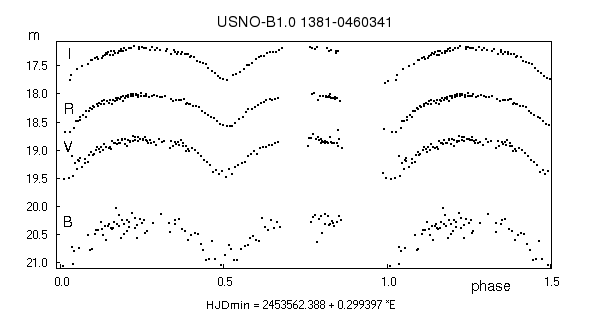"Peremennye Zvezdy",
Prilozhenie,
vol. 6, N 33 (2006)
Prilozhenie,
vol. 6, N 33 (2006)
USNO-B1.0 1381-0460341: a New Eclipsing Binary System Near V1500 Cyg
K. V. Sokolovsky#1, E. P. Pavlenko#2
#1 Sternberg Astronomical Institute and Astro Space Center of the Lebedev Physical
Institute, Russian Academy of Sciences, Moscow, Russia;
#2 Crimean Astrophysical Observatory, Nauchny, Crimea, Ukraine.
#2 Crimean Astrophysical Observatory, Nauchny, Crimea, Ukraine.
Received: 28.11.2006; accepted: 5.12.2006
(E-mail for contact: idkfa@sai.msu.ru)
| ||||||||||||||||||||||
Remarks: |
| Several sessions of high-temporal-resolution BVRcIc photometry of V1500 Cyg
(Nova Cygni 1975) field were carried out by one of the authors (E.P. Pavlenko) using
the
2.6-m Shajn telescope of the Crimean Astrophysical Observatory equipped with an
FLI IMG 1001E CCD camera (Litvinchova & Pavlenko 2006).
We analysed images taken on
May 9; July 8, 10; August 2 and 5, 2005 with the VAST software
(Sokolovsky & Lebedev, 2005). As a result, we detected a previously
unknown variable star
USNO-B1.0 1381-0460341, in 4 arcminutes from V1500 Cyg, near
the edge of our CCD images. It lies in the galactic plane,
l = 89.78 deg., b = -0.02 deg.
The variable is an EW type eclipsing binary with the light elements: HJDmin = 2453562.3878 + 0.2994 x E. Its maximum brightness is 18.75m (V), the amplitude of variability is about 0.75 mag (V). The observed colors of USNO-B1.0 1381-0460341 are the following: B-V = 1.46+/-0.09; V-R = 0.82+/-0.05; R-I = 0.83+/-0.04. The values of interstellar reddening for V1500 Cyg are E(B-V) = 0.45, E(V-R) = 0.35 and E(R-I) = 0.37 (Kaluzny & Semeniuk, 1987). If these values are the same for the very close USNO-B1.0 1381-0460341, then the intrinsic colors could be B-V = 1.01, V-R = 0.47 and R-I = 0.46. There is no evidence for a color change during eclipses. BVRcIc magnitudes were calibrated using the standards C1, C2, and C3 near V1500 Cyg (Kaluzny & Semeniuk, 1987). Using the empiric period-luminosity-color relation for W UMa type stars (Rucinski, 2006), we can estimate the distance to our EW binary. The uncertainty of the above relation is +/-0.25 Mv, it affects the resulting distance stronger than the uncertainty in interstellar extinction. The distance to USNO-B1.0 1381-0460341 can be estimated as 2400+/-300 pc. Acknowledgments: We would like to thank S. V. Antipin for helpful discussion and V.P. Goransky for providing software used for our light-curve analysis. This research has made use of Aladin interactive sky atlas, operated at CDS, Strasbourg, France. |
| References: |
| Kaluzny, J., Semeniuk, I., 1987, Acta Astronomica, 37, 349
Litvinchova, A. A., Pavlenko, E. P., 2006, in Binary Stars as Critical Tools and Tests in Contemporary Astrophysics, IAU Symposium no. 240, held 22-25 August, 2006 in Prague, Czech Republic, S240-92 Rucinski, S.M., 2004, New Astronomy Reviews, 48, 703 Sokolovsky, K., Lebedev, A., 2005, in 12th Young Scientists' Conference on Astronomy and Space Physics, Kyiv, Ukraine, April 19-23, 2005, eds.: Simon, A.; Golovin, A., p.79 (VAST: http://saistud.sai.msu.ru/vast) |
Light Curve
Fig. 1. B, V, Rc and Ic phased light curves. Finding Chart 
Fig. 2. The finding chart. V1500 Cyg is also shown. Data Source |